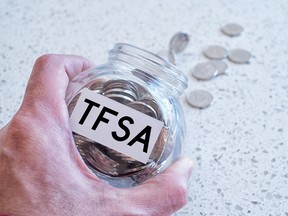Reviews and recommendations are unbiased and products are independently selected. Postmedia may earn an affiliate commission from purchases made through links on this page.
What happens to TFSA contributions and limits once a spouse dies?
[ad_1]
No, you do not now have twice as much TFSA room

Article content
By Julie Cazzin with Andrew Dobson
Q: My wife recently passed and, as per her direction, her registered retirement income fund (RRIF) and tax-free savings account (TFSA) were rolled over/added, in kind, to my own RRIF and TFSA accounts. A friend recently advised me that I am allowed to continue a contribution going forward of $7,000 per year (times two) into my TFSA because it now holds both her and my contributions. This seems totally unreasonable to me, but I thought I’d run the question past you. — Al
Advertisement 2
Article content
Article content
FP Answers: Sorry to hear about the recent loss of your wife, Al. “Rolling over” registered assets from a deceased spouse to the survivor is a common strategy to defer taxable income and allow assets to remain in tax-preferred accounts. Registered retirement savings plan (RRSP) and RRIF accounts can remain tax deferred and TFSA accounts can remain tax free.
The owner of a TFSA account can name a beneficiary or a successor holder for the account. If a spouse is named as a beneficiary, the TFSA — up to the value on their date of death — can be paid into the survivor’s TFSA on a tax-free basis. This must be done by Dec. 31 of the year following the death. Any other non-spouse beneficiary can have the TFSA account paid to them, but not directly into their TFSA.
Only a spouse can be named as a TFSA successor holder, and there is a subtle difference from being named a beneficiary. A successor holder can become the account holder for their deceased spouse’s TFSA. They can also elect to have the TFSA paid into their own TFSA. So, either way, a surviving spouse can add their deceased spouse’s TFSA to their own. But the successor holder option ensures any income or growth after death remains tax free as well.
Advertisement 3
Article content
The advice from your friend that you can now contribute to both TFSAs or have twice as much TFSA room is incorrect. The only extra contribution room you get is based on the potential deposit of your deceased spouse’s TFSA into your own TFSA. There is no ongoing increase in your TFSA room.
Your wife’s RRIF account can be paid into your RRIF on a tax-deferred basis. If your wife has not yet taken her minimum withdrawal for the year, it must be paid to you and it is therefore taxable. So, this annual minimum withdrawal applies for the account and cannot be sheltered from tax like the balance of the account.
Recommended from Editorial
Assuming one wishes their estate to go primarily or exclusively to their spouse, naming them as successor holder or beneficiary on registered accounts can simplify things. The accounts will not be subject to probate and can be turned over relatively easily with only a death certificate. Tax deferrals or savings can continue until the second death.
Andrew Dobson is a fee-only, advice-only certified financial planner (CFP) and chartered investment manager (CIM) at Objective Financial Partners Inc. in London, Ont. He does not sell any financial products whatsoever. He can be reached at adobson@objectivecfp.com.
Article content




















